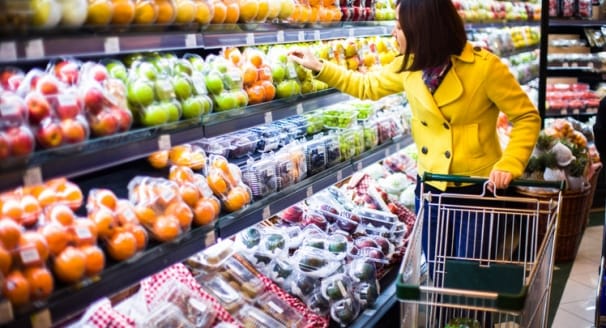Marketers employ a lot of strategies to help us part with more money when we grocery shop. Most of the impulse items that we buy tend to be unhealthy, processed foods. If you are aware of the techniques used to get you to buy then you can come up with some techniques of your own to resist the temptation act impulsively.
1. Shop with a List
Prepare a list of essential food items by section. Try to plan what meals you will use each purchase in so that you are not just buying food emotionally.
2. Set a Time Limit
Attempt to grocery shop in the least amount of time possible. The faster you shop the less time you have to be tempted to buy unnecessary items.
3. Perimeter Shop
Shop the outside of the grocery store, where you will find the whole foods like fruit, vegetables, meat and dairy. If you avoid the inner aisles you will avoid the pre-packaged foods full of sugar, salt, fillers and preservatives.
4. Avoid buying anything with more than 5 ingredients
Make sure to always scan the ingredients list of any pre-packaged foods that you absolutely need to buy. If there are 5 or fewer ingredients then you will likely be eating something somewhat nutritious. If however, the top ingredients are sugar or corn and there are lots of ingredients and ingredients that you can’t pronounce you may want to consider a healthier alternative.
5. Do Not Buy Multiples
A popular marketers trick is to advertise a slightly lower price if you buy more than one of a product. If you do not need the item to begin with you do not need more than one.
6. Do Not Buy Items Only Because They are On Sale
If the item is not on your shopping list then you are actually not saving any money when you buy an item on sale, even if it’s deeply discounted. Think about the total cost of your groceries as opposed to getting great prices on lots of food items that you might find a use for at a later date.
7. Do Not Buy anything while lining up
The items closest to the cashier are often the most hard to resist. Do your best to avoid looking too closely at the empty calories at the checkout.
8. Go on a full stomach
You will be less likely to respond emotionally to food if you feel full. Make sure to eat a good meal before you go grocery shopping and you will be less likely to grab items that you will want to tear into the second you get home and unpack.
9. Pay with cash
Set yourself and budget and take that budget in cash. You will tally up the total as you go and will be less likely to splurge on those extras when there is no contingency other than the items you need for your meals.
10. Avoid Samples
Grocery stores are clever because when they have free food samples and you try them, you feel a sense of obligation to buy the item. This obligation of reciprocation is one way to get you to buy on impulse and often there will even be coupons to sweeten the deal.

